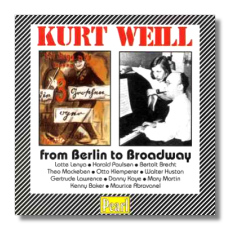
The Internet's Premier Classical Music Source
Related Links
- Weill Reviews
- Latest Reviews
- More Reviews
-
By Composer
-
Collections
DVD & Blu-ray
Books
Concert Reviews
Articles/Interviews
Software
Audio
Search Amazon
Recommended Links
Site News
 CD Review
CD Review
Kurt Weill

From Berlin to Broadway
- Excerpts from: The Threepenny Opera, Happy End, Rise and Fall of the City Mahagonny, Knickerbocker Holiday, Lady in the Dark, One Touch of Venus, etc
Carola Neher
Lotte Lenya
Bertolt Brecht
Walter Huston
Gertrude Lawrence
Danny Kaye
Mary Martin
Kenny Baker
Various other performers
Pearl GEMMCDS9189 ADD monaural 2CDs 77:50, 77:37
Did coming to America dull one of this century's most talented composers of music for the German theater? Nonsense. Kurt Weill simply turned into one of this century's most talented composers of music for the American theater. He arrived in America in 1935, and it took him only a few years until he was writing theater music for Broadway that was idiomatic and of the very highest quality. Therefore, if one finds fault with the American Kurt Weill, then one must find fault with American musical theater from the thirties and forties in general, because Weill was one of its best craftsmen.
This new collection from Pearl shows us just how smoothly and quickly the change in styles was effected. It also preserves some especially rare recordings. For example, Pearl includes an eight-minute potpourri of songs from Die Dreigroschenoper - here, the female singer is not Lotte Lenya but the chickadee-voiced Carola Neher, whose timbre is too innocent for comfort, and rightly so. (Imagine Minnie Mouse as Lady Macbeth.) This Electrola recording, recorded in 1929, predated the Telefunken recording by about a year, by which time Neher was out and Lenya was in. Pearl has selected twenty-five minutes of music from the later recording for this collection, perhaps not a wise choice, given its availability elsewhere, but it does give the collection perspective. There's also a 1929 recording (originally on the Orchestrola label) of Brecht himself, singing a number from this score, and the young Otto Klemperer, in four excerpts from the instrumental Kleine Dreigroschenmusik - nothing like his later, tamer recording with the Philharmonia Orchestra.
Talk about "original cast recordings"! When Walter Huston sings "September Song" with its original, more disquieting lyrics, every other version since then sinks into oblivion. What about Gertrude Lawrence and Danny Kaye in Lady in the Dark, with a book by Moss Hart and lyrics by Ira Gershwin? In spite of great songs such as "My Ship" and "This is New," this show is unaccountably neglected today, and these twenty-two minutes are its fullest representation on CD. (Try hunting down the studio-made LP with Rise Stevens, Adolph Green, and John Reardon.) One Touch of Venus paired Weill with lyricist Ogden Nash, and Mary Martin with Kenny Baker. Again, Pearl has done both Weill and American musical theater a great service by compiling over thirty minutes of original cast recordings from this show. Highlights include Martin's sexy "Speak Low" and Baker's "Westwind," crooned in his best matinee-idol style.
The weakest aspect of this release is its inclusion of only two songs from Weill's French years, and these in recordings made after the fact by Lenya. These two recordings are part of an obscure set of six made in 1942/43 for the Bost label. The pianist is unidentified, but Lenya claimed that it was Weill himself. The awful quality of the original recordings makes these six documents sound at least ten years older, but it takes more than surface noise to obscure Lenya's impassioned singing (granted, it's an acquired taste) and Weill's powerful music. The rest of the recordings in this collection sound a good deal better.
Producers Tony Watts, David Lennick, and Colin Brown promise a second volume of Weill rarities. I hope I don't have to wait until September to hear it.
Copyright © 1996, Raymond Tuttle


















